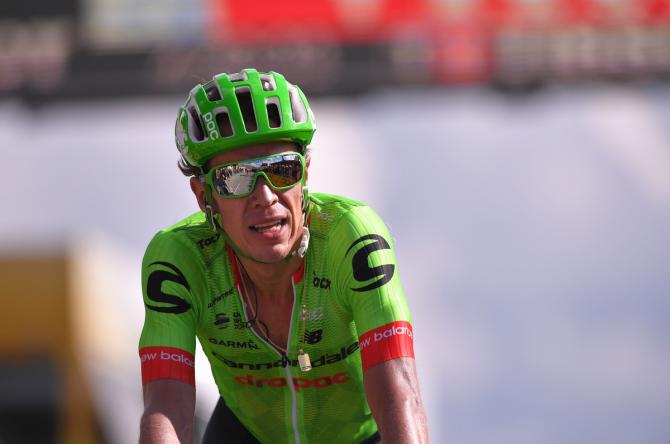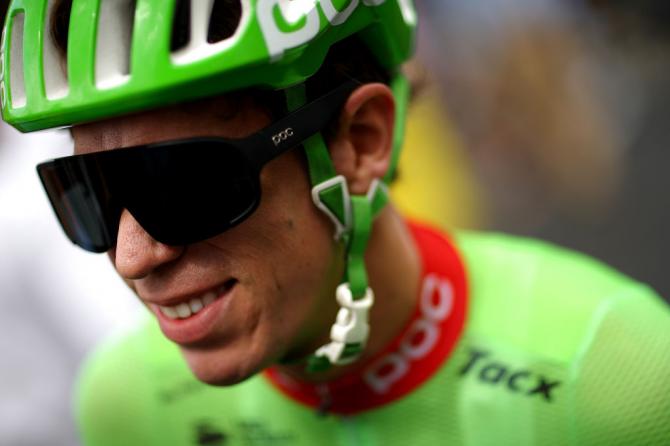Uran: Taking life day by day
Colombian explains his approach to life, pro racing and the Tour de France





Rigoberto Urán achieved the best result of his cycling career when he came second in the 2017 Tour de France. His golden years seemed to be behind him, but a run of good form and good health, along with a philosophy of taking things one step at a time, saw him come within a minute of winning the yellow jersey. He tells Procycling how he did it.
Rigoberto Uran: Fame means nothing to me, I just love racing my bike
Uran eyeing a possible Tour de France-Vuelta a Espana in 2018
Quintana, Uran, Gaviria launch new Colombia Oro y Paz race
Uran and team looking to put on a show at Oro y Paz
Colombian pros feted at Oro y Paz teams presentation - Gallery
To subscribe to Procycling, click here.
Día por día. Not even Rigoberto Urán's Latin American Spanish make interesting three of the most mundane words in professional cycling. Day by day. A phrase that has become so widespread in press conferences and mixed zones the world over, but one that says so little.
You get the sense, however, that Urán actually means it. "For me, there is no past, there is no future, only the present," he tells Procycling in a hotel meeting room in Japan. Urán drives his point home with a smile: "There is only today, right here, right now."
The words 'día por día' passed his lips countless times in July as he made his way to second place at the Tour de France. Having last graced a Grand Tour podium at the 2014 Giro, he flew into the race under the radar but claimed a thrilling victory on stage 9 in Chambéry, millimetres ahead of Warren Barguil. From then on, it was one pedal stroke at a time all the way to Paris.
Urán's approach to a Grand Tour mirrors his approach to life in general. "At the Tour, on the first day I'm not thinking about the final stage in the mountains – no, today is the first stage, tomorrow is the second. Día por día. That's how I try to see things in life," he explains.
"The future, we don't know about. The past has gone. There's only today."
The latest race content, interviews, features, reviews and expert buying guides, direct to your inbox!
Urán's outlook has been shaped by the extraordinary nature of the journey that led him from provincial Colombia to the upper echelons of European cycling. It has been a path marked by obstacles, setbacks and even tragedy.
When he was just 14 years old, Urán lost his father, who was killed at the hands of paramilitary fighters in the midst of long-running conflict in Colombia. The innocence of childhood ended abruptly.
"I had to take on all responsibility for the family," says Urán, who went around on his bike selling lottery tickets to provide for his mother and sister. "At 14 I was, let's say, the 'papa' of the family. I had to become a grown-up at 14."
It's at this point that Urán's vision fixes on what's immediately in front of him. He quickly got on with his life and has never liked to dwell on the death of his father, or at least open up about it publicly. In our interview, he refers matter-of-factly to his childhood as "normal" and "without problems".
"Obviously I lost my father at a very young age, but I overcame it. Everything, everything, everything can be overcome.
"We, as human beings, adapt when we have to. If there's a need to do so, we learn and we adapt. So that period wasn't difficult – not at all. Now I can say, 'Oh, it was tough,' but at the time, in the moment, no problem."
In the moment. No problem. Is it any wonder that Urán would want to live day by day? When the past is painful and irretrievable, and the future suddenly so unreliable, the present becomes the only solid ground.
Urán had to grow up fast. He had been given a bike just before his father died and won his first race. He quickly made a name for himself on the local scene and at 17 he attracted the attention of the regional Orgullo Paisa team. Colombian rules state that riders can't be salaried until they're 18, but he somehow talked them into giving him a pay packet so that he could send money back to his mother.
It wasn't long before he was making the journey to Europe. An acquaintance arranged for him to join the Tenax team in Italy in 2006, and suddenly Urán was a professional cyclist at the age of 19.
It was a rocky road to begin with. He suffered two bad crashes in his first two seasons, the first resulting in a broken collarbone on his introduction to Belgian cobbles, the second in two broken elbows and a broken wrist at the Deutschland Tour. "With that one, they told me it would be difficult to make a complete recovery. So I was worried I wouldn't go back to being a cyclist – I'd barely started."
On top of the bumps and bruises came the alienation of being thrown into an entirely different culture and a language he didn't understand. Did he ever worry that this life might not be for him after all?
"I didn't know. The future, you don't know. You just get by."

The only thing that changed is the outcome
Urán continued to put one foot in front of the other and a decade later, he's here, one of the best-paid cyclists in the world and a favourite for the next Tour.
It was a different picture this time last year, however. A star that had once burned bright with promise seemed to have faded. Urán joined Team Sky from Caisse d'Epargne in 2011 and went on to finish seventh and two times second at the Giro d'Italia between 2012 and 2014. But as he entered what are considered the peak years for a Grand Tour rider, he fell short of the expectations he'd raised, finishing 14th at the Giro in 2015 and then seventh in 2016. At the start of July, few still considered him a Grand Tour contender.
"You do start to have doubts, yes. I doubted myself, but I don't think I ever doubted my ability – it was more my health," he says, bronchitis having derailed his last two Giro bids. "The most important thing in a three-week race is feeling okay on all 21 days – condition is important but so is your health. So there were doubts, but doubts about staying healthy for the duration of a race."
"In hindsight, I see those years as quite normal. In terms of results, in the Grand Tours at least, they maybe weren't as successful as I'd hoped, but sometimes the results come, and sometimes they don't."
Urán, who had been solid if unspectacular in the first part of the season, went into last year's Tour hoping for a stage win and a place in the top five, but made the most of what he describes as "the best condition I've had in my career". What changed?
"Nothing, nothing at all. I'm the same. I worked the same. The only thing that changed is the outcome. I always had faith, you just have to wait for things to fall into place. Everything comes at its time."

A born entertainer but ambitious and focused
It quickly becomes clear that there's much more to Rigoberto Urán than just a bike racer. Yet you wonder how much of that people see.
For someone who was on course to finish on the podium, there was something strangely low-key about him at the Tour. The famous hordes of Colombian fans, of course, made their voices heard, migrating from the Movistar bus of the ailing Nairo Quintana, but otherwise Urán commanded relatively little attention. On the top of the Col d'Izoard, the final mountain stage of the race, television cameras and race officials swarmed around the yellow jersey of Chris Froome, who was rushed into anti-doping and then the podium area. Meanwhile there was a full-circle media scrum around the great French hope Romain Bardet, who sat cross-legged on the tarmac staring blankly into space – a dramatic tableau of a sportsman coming to terms with what this meant for him and his nation.
Over with Urán it was a more mundane picture. Only a handful of reporters waited beside him as he grabbed a jacket and snood from his soigneur and checked the whereabouts of the team bus. He politely answered a few questions, looked around at the chaotic mountaintop scene, and rode down, away from the fuss.
The sense is that Urán, to the casual observer at least, might come across as inaccessible, unknowable. But he's actually an extrovert, his personality spilling out away from the pressure cooker atmosphere of major races.
"He likes dancing to Colombian music – a lot, and he likes singing to Colombian music – a lot. Anytime, anywhere," EF Education First-Drapac team manager Jonathan Vaughters tells Procycling with a chuckle. Urán, by all accounts, is a natural at making people laugh, a born entertainer. Practical jokes are a staple, and he recently made headlines across Colombia when, on a visit to the presidential palace, he hijacked the lectern to pose as the head of state, sending the room into fits of giggles with his visions for the country. The photographic evidence was soon on his social media accounts with the hashtag #RigoPresidente. There's even a YouTube compilation of his 'locuras' – his antics.
In a similar way, Urán's subscription to the 'what will be, will be' and 'day by day' philosophies perhaps masks the extent of his ambition. After all, you don't have a backstory like his without serious levels of drive and determination. What might initially come across as diffidence is actually tenacity and stubbornness.
"I can't say, 'What will be will be,' while sitting on my arse at home. I have to go out and train, make sacrifices, work hard. I can't just wait for good results," he says. "The calmness comes when the result is settled. Afterwards. Because what happened has happened."
Vaughters adds: "When you get to know him one-on-one he's incredibly ambitious and focused, but he gets things done in sort of a below-the-radar way, and that's the right way for him.
"He's very autonomous and is able to get done what he needs to get done without a lot of interference or advice or whatever. When you try and put too much infrastructure around him it actually starts to hurt him."

Cycling isn't my whole life
Urán is a model of healthy detachment from work. He refers to cycling as as "business", and insists he can rise above the stresses that go with it.
That must have been stretched to its limit last summer. After the high of the Tour he and his teammates received emails saying they'd been released from their contracts. He'd only just signed a new three-year deal but a budget shortfall meant the Cannondale-Drapac team was staring into the abyss. In the end it was he who was credited as the saviour. He had a queue of suitors lining up for his signature but he gave Vaughters two weeks to find a new sponsor and Vaughters pulled it off.
The episode only underlines Urán's status as leader and talisman, with enhanced responsibility for the success of the whole team. He is reaching a point, at 30, where he has limited time to parlay his physical peak into career-defining achievements. But Urán is an expert at avoiding pressure. The Tour, Vuelta and the Worlds are the key races on his 2018 schedule, but he maintains they won't come to define him as a person.
"Sometimes we place too much value on results. My happiness, ultimately, does not depend on whether I win races or not," he says, talking enthusiastically about his family life and his burgeoning cycling apparel business.
"For me, cycling is a job, one that I enjoy, that I respect, and that I try to do as well as I can, but cycling isn't my whole life. It's just one part of it," he says.
After a long pause, he adds: "Everything I do, I just try to enjoy it to the maximum."
And that brings us back to Urán's desire to live in the moment. His really is a simple philosophy – one that does away with the complications of the past and the future. Día por día.
This feature first appeared in Procycling January 2018, now available. Subscribe at here.
Patrick is a freelance sports writer and editor. He’s an NCTJ-accredited journalist with a bachelor’s degree in modern languages (French and Spanish). Patrick worked full-time at Cyclingnews for eight years between 2015 and 2023, latterly as Deputy Editor.
